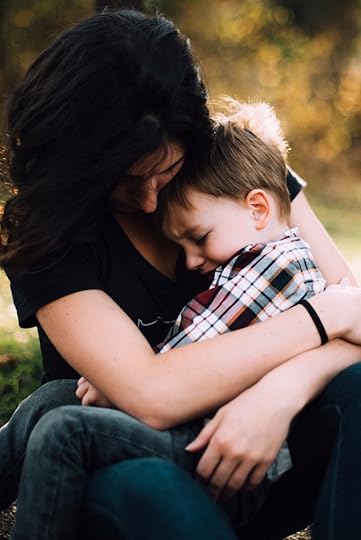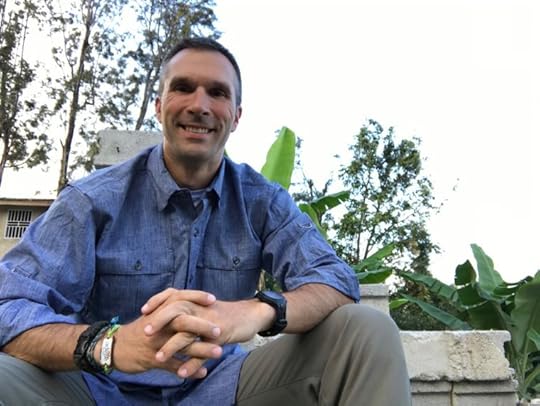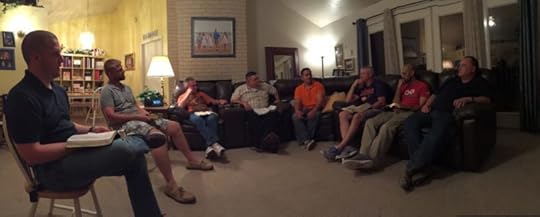Kenneth A. Camp's Blog, page 8
August 28, 2017
Taking A Closer Look at Connection: A TBRI Principle
God created us to connect. If that is true, then why are so many of us terrible at connecting? What many of us don’t realize is that a lot of our ability to connect with others is either enhanced or hindered in the first couple of years of our lives.

The way a parent, especially a mother, interacts with her baby while in utero, the weeks following birth, and throughout the baby months will often come naturally. I think every new parent feels ill-prepared and inadequate when they bring a newborn home. However, all you need to do is watch how people respond when they see a tiny baby. Grown men even will begin babbling in some unknown language as they shower a baby with loving attention. Women line up to take turns holding and rocking the baby. Everyone wants to jump into action to meet every need when the baby cries the slightest whimper.
All of these actions create connection. We now know that this connection creates healthy brain chemistry. Every time a child encounters someone who meets their needs, positive synapses connect across their brain. The child feels safe and can explore their ever expanding world.
But what happens when a baby, whether in the womb or after, doesn’t receive this kind of nurturing attention? What if something even worse happens and that baby or older child experiences trauma? If a baby or child endures a stressful pregnancy, a difficult delivery, abuse, neglect, or even abandonment, then the brain chemistry takes on a much different path.
Instead of a child feeling safe and willing to explore their environment, this child interacts with their world in a constant state of fear. That alert part of their brain, or the amygdala, is over developed and is easily triggered into a response of flight, fight, or freeze. This is how most, if not all, children that come to families through adoption or foster care tend to act.
Parenting a child that constantly reacts to their world with some kind of fear can exhaust and confuse a parent. The child’s behavior often pushes a caretaker away making it harder for the parent to connect with this child. But connection is exactly what the child needs more than anything.
A child whose behavior pushes you away is a child who needs connection before anything else. Kelly Bartlett—Encouraging Words for Kids
“But doesn’t connection before anything else simply excuse bad behavior?” That is the common question when one learns about connected parenting. The approach seems too permissive.
Here is the reality. When a child, or anyone, is controlled by the fear part of their brain, attempts to correct misbehavior will only feed the fear behaviors—meltdowns, outrage, fighting, running away, or just shutting down.
The intent of connecting first isn’t to excuse the behaviors, but is instead to create a safe place for that child to receive correction. Sometimes they also need empowering. I wrote about this in depth in this blog post—Taking a Closer Look at Empowerment.
When we focus on connection, we help our children learn the following (from The Connected Child: Bring hope and healing to your adoptive family:
Learn to trust
Discover his voice
Learn to self-regulate
Understand his own preciousness, knowing they have value—opposite of shame.
In my book, Foster and Adoptive Parenting: Authentic Stories that Will Inspire and Encourage Parenting with Connection, I share stories from my own journey, and some other families, to connect as a parent. I am vulnerable as I make many mistakes, and a few successes as I work toward building trust and attachment with my son. Here are a few things that I share in the book:
Understanding, Recognizing, and Responding to my child’s fear
Securing your child’s attachment
Establishing a safe haven for your child
Balancing nurture and security
I am always looking for ways other parents committed to connected parenting succeed. If you have some stories you are willing to share, will you leave your story in the comment section below?
There is something that each of us wants more than anything—even more than the air we breathe: Connection.Curt Thompson, M.D.—Anatomy of the Soul
August 24, 2017
Dad to Dad Interview with Danny Cook [Podcast 028]
Sometimes It Is Obedience Rather than Desire
In this Dad to Dad episode I interview Danny Cook, pastor of Legacy church in Round Rock, Texas. He and his wife, Rachel, have fostered 20 kids over about seven years, adopting one.

I know you will appreciate Danny sharing his story in an authentic, vulnerable, even raw at times, way. Below you can see some summary notes from the interview. Enjoy and please share the link.
Show Notes
Danny’s story begins out of obedience.
Saying yes to fostering gives you a front row seat to watch life transformation.
You do give up some of your life so that a child can find their life.
Find out where you can get the motivation to do the hard yet right thing.
Danny shares a couple of huge turning points in his journey as a foster dad.
How to help men talk about their fears.
Danny talks about the joy of working with men who say yes when it is so easy to say no.
Danny shares about a ministry that he and Rachel lead called Unshaken that equips and encourages foster and adoptive parents.
Contact Info and other stuff
You can contact Danny to find out about the Unshaken groups or ask him questions about foster care and adoption. Reach him at danny@legacychurchtx.com or on Facebook.
Danny also mentions a couple of resources:
Jason Johnson Blog. You can listen to a podcast interview with Jason Johnson HERE.
August 21, 2017
What Is God’s View on Racism?
No matter where you live in the world, if you pay attention to world news, I imagine that by now you have at least heard about the racial violence that happened in Charlottesville, Virginia, USA.

Over the past several months, if not the past several years, racial tensions that simmered under the surface have erupted out into the open. It is not a pretty sight. In fact, it is quite ugly. For many reasons no doubt, more and more people feel as if they can use violence to communicate their hatred.
I don’t feel anger. I don’t feel confusion. What I feel is a deep-seeded sadness that resembles depression.
Just in case you don’t know this already, I am white, male, in my mid-50s, and hold to morally and fiscally conservative views. I know now that those facts about who I am causes some kind of negative emotion in some of you.
But these facts about me are also true. I give away money every year, much of to causes that help meet the needs of those less fortunate than I am. Ten years ago, I quit my full-time job and moved, along with my wife, to Thailand to volunteer as a missionary. During that time we invited a young single mother of two children to live in our home in Texas rent free. About six years ago, Danielle and I stood before a judge and took an oath to adopt an almost two-year-old child into our forever family. I tell you these things to reveal to you my heart.
When it comes to race, yes I see the different races of people around me. I also recognize that others see the world differently than I do, and a big reason for that is the difference in our race and culture. But another person’s differences doesn’t repel me. Instead I am drawn to them. I want to know where they are from, how they view the world, what they consider important and unimportant, even if these things are very different than my own. I don’t deem one person better than another person based on any kind of criteria. And here is why.
The way I view others, whether they are like me or very different than me, is through the lens of the One who transforms my heart.
God’s view goes beyond a person’s race, culture, or worldview. He peers into a person’s heart. He isn’t a progressive liberal or an alt-right conservative or anywhere in between. He is completely set apart from all that. He isn’t concerned about where you or I are land on that spectrum, or what culture we come from. We all, even though created in His image, are very different than He is. He is complete lacking in nothing. He is pure. He is righteous.
Racism isn’t just an American problem. It is a humankind problem since the beginning of time. People’s hearts need transformation if their actions and attitudes are to change. The only One who can and will do that is God.
So what is our role in all of this? Certainly not shouting louder than the other person. And absolutely violence isn’t the answer. These only harden hearts.
Intercession. Not just empty words uttered to whatever. I mean our hearts crying out to God interceding for our nation, beseeching Him to change our hearts. When we see God move and transform who we are, then we will see healing in our land.
I haven’t found that anywhere on social media or on the 24/7 news, but I trust that some are standing in that gap. I am ready to call upon God. Are you?
August 17, 2017
Life Transformational Bible Study: Interview with Carey Camp [Podcast 027]
Yes, if you caught the last name, Carey is my brother. Over the past few years, he shared several cool stories about a small group of guys that began meeting in his home about five years ago to study God’s word. That grew into three different groups meeting in different homes on different nights.

I asked Carey to share the stories with me on this podcast episode, because I think you will enjoy hearing how and why a group of four guys grew into over 30 without any publicity except word of mouth.
As I say at the beginning of the podcast, our voices sound similar, but I promise you, it is my brother on the interview with me!
In the episode you will hear the following:
How Carey wanted a Bible study that was more than just gaining knowledge. He longed for life transformation.
Why he thinks that eating a meal together is a vital element.
How Carey felt he needed to let go of his “ownership”. That is when things really took off.
Carey shares a few fun stories. One about a Jewish guy asking if he could join their study. Another about a guy’s house that people kept knocking on his door trying to find the Bible study. You don’t want to miss these!
Enjoy!
[contact-form]
August 10, 2017
You Are Probably A Worthless Vessel Unless You’re Broken
That is a paradox when you first read it, but it’s true. If you need to carry water, then yes an unbroken vessel is best. But I am talking about you and me. The falsehood that we believe is that we need to be perfect and whole to be of any use to anyone or anything.

The real tragedy happens when we quit or feel unqualified only because we come face to face with our own brokenness. I can’t count the times I felt this over my lifetime.
Just a couple of weeks ago, I limped into the kitchen from my office to announce to my wife that I quit. I went on to bemoan how I wondered why I ever thought that I could be a writer and a podcaster. Nobody wants to hear what I have to say! I am too broken and messed up.
My wife patiently listened to my sad venting and kindly encouraged me. I am thankful that she was here and for how she responded.
God also sees things differently than I do. He finds great value and usefulness in our brokenness. God patiently reminds me that is exactly when He can use me. When I am broken.
When I am not in touch with my brokenness, I am full of pride, unforgiveness, judgement, a lack of self-awareness. It’s not a pretty thing. I think that I am in good shape for His use when I “have it all together”. However, my temptations, my weaknesses, my sin control me and not His Spirit.
Ironically when I first get in touch with this reality—how broken I am—that is when I feel the most useless. I know what it is that causes it too. Lots of counseling, books, podcasts, etc. has taught me that it is shame that tells me I am useless.
Shame tells me that I can’t help anyone else with foster/adoptive parenting. It asks me who am I to encourage others to live a life on mission or support foreign missionaries. And that all I do is fail when I try to parent my son with connection.
Of course these are lies that the enemy or my own broken spirit whispers in my head, and they all stem from shame. Just like the way Adam and Eve responded when they messed up. Shame caused them to hide then accuse each other and God.
So what do I do about this when for the one thousandth time it creeps up on me?
First, I don’t stay there. I am the first to recommend getting help when you mess up or are messed up. I needed to get lots of help at different times in my life. But if I chose to not allow others to help me change my life, it is like saying I just want to keep my crapped-filled underwear on. That is what a baby does because he doesn’t know how to clean himself up.
Second, I remember that I am safe with God. He has proven over and over that He will take my broken vessel and make me useful. He isn’t out to destroy us or throw us away like we do with so many things today in our throwaway society. God places a priceless value on our lives, our souls.
Third, I let go of my weakness and place it in His hand. I willingly let Him use my brokenness. He is masterful at taking my messed up life to meet other messed up people where they are at. He knows that most people, if not all, will respond to His glory in my life, if they can see how He has redeemed me from my brokenness.
When I do these things, my weakness becomes His strength for “where I am weak, He is strong.”
You Are Probably A Worthless Vessel Unless Your Broken
That is a paradox when you first read it, but it’s true. If you need to carry water, then yes an unbroken vessel is best. But I am talking about you and me. The falsehood that we believe is that we need to be perfect and whole to be of any use to anyone or anything.

The real tragedy happens when we quit or feel unqualified only because we come face to face with our own brokenness. I can’t count the times I felt this over my lifetime.
Just a couple of weeks ago, I limped into the kitchen from my office to announce to my wife that I quit. I went on to bemoan how I wondered why I ever thought that I could be a writer and a podcaster. Nobody wants to hear what I have to say! I am too broken and messed up.
My wife patiently listened to my sad venting and kindly encouraged me. I am thankful that she was here and for how she responded.
God also sees things differently than I do. He finds great value and usefulness in our brokenness. God patiently reminds me that is exactly when He can use me. When I am broken.
When I am not in touch with my brokenness, I am full of pride, unforgiveness, judgement, a lack of self-awareness. It’s not a pretty thing. I think that I am in good shape for His use when I “have it all together”. However, my temptations, my weaknesses, my sin control me and not His Spirit.
Ironically when I first get in touch with this reality—how broken I am—that is when I feel the most useless. I know what it is that causes it too. Lots of counseling, books, podcasts, etc. has taught me that it is shame that tells me I am useless.
Shame tells me that I can’t help anyone else with foster/adoptive parenting. It asks me who am I to encourage others to live a life on mission or support foreign missionaries. And that all I do is fail when I try to parent my son with connection.
Of course these are lies that the enemy or my own broken spirit whispers in my head, and they all stem from shame. Just like the way Adam and Eve responded when they messed up. Shame caused them to hide then accuse each other and God.
So what do I do about this when for the one thousandth time it creeps up on me?
First, I don’t stay there. I am the first to recommend getting help when you mess up or are messed up. I needed to get lots of help at different times in my life. But if I chose to not allow others to help me change my life, it is like saying I just like sitting in crapped-filled underwear. That is what a baby does how doesn’t know how to clean themselves up.
Second, I remember that I am safe with God. He has proven over and over that He will take my broken vessel and make me useful. He isn’t out to destroy us or throw us away like we do with so many things today in our throwaway society. God places a priceless value on our lives, our souls.
Third, I let go of my weakness and place it in His hand. I willingly let Him use my brokenness. He is masterful at taking my messed up life to meet other messed up people where they are at. He knows that most people, if not all, will respond to His glory in my life, if they can see how He has redeemed me from my brokenness.
When I do these things, my weakness becomes His strength for “where I am weak, He is strong.”
July 18, 2017
Why Won’t Your Foster or Adopted Child Look You in the Eyes?
It Might Be the Key to Why They Resist Your Love

My son is just now beginning to look me in the eyes when I talk to him. He is almost seven and has been in our family for six years. Sometimes I gently hold his cheek and ask him to look at me. He seems to try, but he looks at the ceiling, to either side, glances at my eyes for a split second, then quickly looks away.

I feel sadness rather than anger or frustration. My father heart longs for his trust; for him to feel safe with me.
As I said, he is looking into my eyes now more than he ever has, and when he does, I try to hold his eyes for as long as he will let me.
Do you find it hard to look into someone else’s eyes?
To look fully into the eyes of another person takes vulnerable courage. It’s like we can see into the other person’s soul as they pear into ours.
Sometimes the reason a person won’t look you in the eye is they feel guilty or did something wrong. But more often the reason is…FEAR.
A lot of the rest of the thoughts in this blog come from two sources…a sermon by Morgan Stephens and a book by Dr. David Benner—Surrender to Love: Discovering the Heart of Christian Spirituality (Spiritual Journey). The book isn’t about foster care or adoption, but it reaches deep to the core of why our kids can’t look us in the eye and even push us away, especially his chapter on Love and Fear. “Love and fear stand in a complex relationship to each other.”
That is true for all of us but even more true for our kids that come from a hard place. They probably don’t even know that they live in constant fear, but their actions betray them. Our kids control everything and everyone they can, they won’t try new things, they have a deep sense of guilt even when they haven’t done anything wrong, they struggle with pride and a need to always be better than everyone else in the room.
All of these represent fear. And fear builds an impenetrable wall that resists healing. As parents, our natural response is to push back with anger, frustration, stonewalling, walking away…But our kids need just the opposite. “Perfect love casts out fear.” Of course we will never love perfectly, but we can follow Perfect Love’s example. God always moves toward us because He always loves.
As foster and adoptive parents we too can move toward our kids regardless of how hard and often they resist us knowing that even our persistence can threaten our kids need for control. How well we help our children overcome their fear and allow themselves to surrender to our love will help them later in life in all of their relationships. More importantly it will help them surrender to God’s perfect love which will cast out all fear
Get in the boat!
A story in the Bible goes like this. Once Jesus and his disciples spent a long day with crowds. Jesus sent his disciples on a boat to go the other side of the sea while he sent the crowds away. After the crowds left, he went up on the mountain to spend some time alone in prayer. By the time he came back to the shore the boat was far from land and huge waves from a storm battered the boat. When Jesus saw this, he began walking across the water toward the boat. (He moved toward them!) When the disciples saw him walking toward them, they became even more afraid thinking that it was a ghost. Jesus affirmed them letting them know it truly was them. (We too need to affirm our kids that they don’t need to be afraid since we are with them). Peter, one of his disciples, called out to Jesus, “If it is really you, then tell me to get out of the boat and walk to you.” So Jesus told him, come Peter to come on out. Peter did and began walking toward Jesus. Then he became afraid and began sinking. He cried out for Jesus to save him, and Jesus immediately reached out and took hold of Peter. When Jesus and Peter got into the boat with the other disciples, the wind stopped and all became calm.
Our kids that come to us from a hard place face fear like this every day, all the time. We need to move toward them not away and get into the boat with them to help bring calm and healing to their lives.
July 13, 2017
3 Reasons We Need to Encourage Our Missionaries
3 Ways You Can Encourage A Missionary
Living six months in Thailand serving as volunteer missionaries with Danielle allowed me to see firsthand what life is like for many missionaries. Over the years I have had the pleasure of calling missionaries serving all over the world friend. These missionary friends come from different nations, different churches and sending agencies. Yet they all have something in common. They need encouragement.
[image error]
Son of Encouragement
One of my favorite people in the Bible is Barnabas. His name means “son of encouragement”. Actually that wasn’t his birth name, but he was such an encourager it became his name.
I love this passage in Acts 11 as it’s read in the Message bible. It not only describes Barnabas, but also gives us a great definition of encouragement:
When the church in Jerusalem got wind of this, they sent Barnabas to Antioch to check on things. As soon as he arrived, he saw that God was behind and in it all. He threw himself in with them, got behind them, urging them to stay with it the rest of their lives. He was a good man that way, enthusiastic and confident in the Holy Spirit’s ways. The community grew large and strong in the Master.Acts 11:22-24 Message
For some reason we treat missionaries as if they are superhuman who never have a tough day. We don’t let them have a tough day. It is as if we feel that since they signed up for this job, then they should be able to handle it. Yeah we put their prayer card on our fridge and attend their reception when they are in town on furlough (if it fits into our schedule). But if we are honest, we don’t think about them very often. We pray for them even less. And we hardly ever encourage them.
I will let you in on something. Those who serve as missionaries are not superhuman. They are not even extra-ordinary. They are just like you and me. They get tired, discouraged, tempted, and even frustrated.
I think that missionaries often feel that they can only share positive reports with those who send and support them. Yes we do want and enjoy hearing the good things that God is doing around the world. But our missionaries need trusted friends who will listen to the tough times too and encourage them.
Why do we need to encourage our missionaries?
We sent them. It isn’t just the responsibility of the missionary to reach the nations. We are in this together. If you are not on the field, then you have another role. You might not always have time to go to where a missionary is serving. You might not have financial resources to send (I think we all have something to give by the way), but you can always encourage. With the ease of communication in today’s world, you can send encouragement to a missionary anytime serving anywhere in the world.
Cross-cultural ministry is hard. Language. Cultural norms. Isolation. If you want to learn more about this read 13 Challenges Missionaries Face.
The enemy will do anything to get them to quit. We don’t wrestle with flesh and blood. Yes missionaries serve in places where governments, other religions, and worldview fight against them. However, the reality is that we are really fighting against a supernatural enemy who wants every missionary to fail. He will try to discourage, tempt into sin, destroy relationships…really any way he can do it, he will try.
I hope you’re convinced and compelled to encourage missionaries that you know. Not sure how? Let’s look back at that Acts 11 passage. What did Barnabas do?
3 Ways We Can Encourage Missionaries.
He threw himself in with them. I love this phrase. You can do this in different ways, such as, working with them in country, setting up regular times to talk in person, become a trusted friend, and most importantly, intercede for them often.
Got behind them. Find out if they have a support team…if they don’t ask them if they want one. Financially support their work. Host them when they are home on furlough.
Urged them to stay with it. Sometimes you will “speak the truth in love”. Rejoice with them over what God is doing through them. And other times you will simply listen to them during tough times.
Question: Do you have any relationships with missionaries where you can encourage them in a way that urges them to stay with the work God called them to?
July 7, 2017
Dad to Dad Series Introduction [Podcast 026]
Why it Is Important that We Fully Engage as Foster and Adoptive Dads
I am introducing a new podcast series I am calling Dad to Dad. While attending the CAFO (Christian Alliance for Orphans) Summit earlier this year, Amy Holman, who ran the bookstore at the summit, suggested that I create some podcast episodes directed toward other foster and adoptive dads. I loved the idea.
[image error]
Our wives tend to do a better job of seeking support and encouragement where we men often try to handle it ourselves. We aren’t always comfortable sharing with others, especially when it reveals a perceived weakness or failure.
I hope that the Dad to Dad episodes will give foster and adoptive dads some support, encouragement, and challenge. I also hope that this isn’t just a one way conversation. I want you to dialogue with me, ask me questions, share your stories, even schedule a podcast interview with me.
To kick off this series, after introducing it, I touch on three reasons why I think it is important that we as fathers fully engage and embrace our role.
After you listen, let me hear from you. Also, share the podcast with your friends who are also foster or adoptive dads.
What you will hear on the podcast episode:
Most content about foster care and adoption is written by moms for moms.
Foster and adoptive dads need support, encouragement, and a challenge.
I share a story about how watching out my office window my son ride his bicycle brought back a memory of about 10 years ago.
Reasons why any child needs an engaged, fully present father figure.
Parenting foster and adopted kids isn’t just what our wives do. It is what we both, as mothers and fathers, do.
I talk about some sacrifices you, as a father, might need to make.
I dig into 3 reasons why it is important we as fathers fully engage our kids.
I really do want to hear from you. If you have anything to add, questions to ask me, or suggestions for future Dad to Dad episodes, including potential interviews, please leave me a comment below. If you prefer to correspond privately, fill out the contact form found below.
This past Monday, July 3, I turned 56 years young. Yeah, I know it is hard to believe it, but it’s true. To celebrate my birthday, I am offering the Kindle version of my book, Foster and Adoptive Parenting: Authentic Stories that Will Inspire and Encourage Parenting with Connection, for only 99 cents until July 10, 2017.
Already read the book? I would greatly appreciate it if you would kindly leave a review on Amazon and Goodreads. To leave a review on Amazon, follow the book link above and scroll down the page to the review section. Then click on the “Leave a Review” button.
To leave a review on Goodreads, click HERE.
For an author that is one of the best gifts you can give—purchasing their book, leaving a review, and telling your friends about the book. Thank you for your birthday present!
[contact-form]
June 30, 2017
Your Foster or Adopted Child Needs Space to Heal
6 Ways to Give Your Child Space

Summertime with a son is so much different from when we didn’t have any kids. When it was just Danielle and I , summer wasn’t much different than any other time of the year.

That is all different now that we have a six-year-old son. Danielle’s main summer job is thinking of ways to keep a very active boy busy. So we spend days at the swimming pool with friends, going out-of-state on a plane for the first time, vacation bible schools, sports camps, visits to family and friends in other towns. Did I leave anything out?
We easily could have signed our son up for a baseball league, a swim team, a soccer league, and gymnastics. Why not? It’s what American, middle-class families do these days. We don’t want our kids to miss out on anything in life. Or, for me at least, I don’t want to hear those words, “Daddy, I am bored!” Besides what will we post on social media if we don’t do all of it?
The thing is a busy schedule might not be the best thing for your foster or adopted child. Some would say it’s not good for any kid.
Still, most of our families are busy…too busy. A mistake that a foster or adoptive family makes with their kids after they are placed into their families is to overwhelm them with activities, especially if the family already has other children.
Instead of our goal being for our foster or adopted children feeling like they fit in, we need to consider what they need so they can heal and overcome the trauma they have experienced. That will mean we need to give them space which includes room and time.
Here are some 6 ways giving your child space might look like:
Postpone any big parties or celebrations. This probably is mistake number one. Naturally a family, and everyone around them, is excited when a child is placed into their family. This might not apply if the child is a young baby, but it will with an older child. Give your child time to adjust to his or her new surroundings before throwing the party.
Spend lots of time together as a family so you can bond. This means that you will need to slow down your schedule. That might include delaying travel plans, turning down a promotion that will demand more of your time, or cutting back on other commitments. Your whole family will benefit from this and you might never go back to that crazy schedule.
Don’t rush them into leagues or activities that require a big time commitment. I love sports, especially team sports. My son is at the age where many of his peers are playing baseball, soccer, on a swim team, etc. If my son begged me to do the same, I would consider it, but he isn’t.
Allow for plenty of free time. This feeds off the previous suggestion well. Because my son doesn’t have any longterm commitments like a sports league, he has time to just play. He explores, builds, reads (or we read to him), and taps into his imagination.
Adjust expectations for school. That might sound strange when we are talking about making space for your child, but our expectations can put undue pressure on our kids. The longer a child has lived in a chronic state of fear, the harder it is for them to focus on learning. It doesn’t necessarily mean that they have a learning disability, but we as parent will need to adjust our expectations.
Space for big emotions. Children who come a hard place have big emotions. We need to learn how to be okay with that and how to properly respond to these emotions. Squelching or shaming our kids when they express big emotions will never give them the space they need to heal from the cause of the emotion.
A couple of things to remember:
First, your child’s needs for space will ebb and flow especially as they move through transitions. Second, let other people’s unhelpful criticism or questions roll off, especially those who don’t understand trauma. You know what your child needs to heal better than anyone.
What would you add to this list of ways to give your child space to heal?
If you haven’t already, grab your copy of Foster and Adoptive Parenting: Authentic Stories that Will Inspire and Encourage Parenting with Connection on Amazon. This topic is discussed throughout the book.
If you have read the book, will you do me a huge favor? Click on that same link and leave an honest review of the book. Your review will bring more attention to the book. Thank you!



